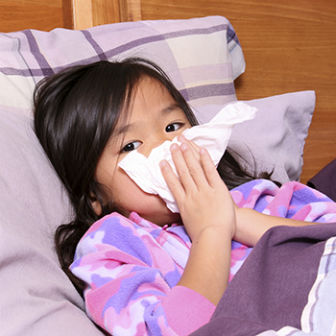Have a Baby or Young Child With a Cold? Most Don't Need Medicines
On this page:
What can parents do when their babies and young children have a cold? It depends on the child’s age.
Although most colds in children don’t have serious complications, they can cause great worry to caregivers, and are among the top reasons for visiting a doctor. FDA doesn’t recommend over-the-counter (OTC) cold and cough medicines for children younger than 2. For infants and children younger than 2, those medicines may have serious and potentially life-threatening side effects.
So what’s a worried parent to do? Here are some tips from FDA on how to safely treat your child’s cold.
Relieving Cold Symptoms
There’s no cure for the common cold, a viral infection that cannot be treated with antibiotics, says FDA’s pediatrician Amy M. Taylor, M.D., M.H.S.
“A cold is self-limited, and patients will get better on their own in a week or two without any need for medications. For older children, some OTC medicines can help relieve the symptoms—but won’t change the natural course of the cold or make it go away faster,” says Taylor, a medical officer in FDA’s Division of Pediatric and Maternal Health.
Coughs are a normal symptom of a cold and aren’t all bad. “Coughs help the body clear the mucus out of the airway and protect the lungs; so you don’t want to suppress all coughs,” Taylor says.
Non-drug treatments for coughs include drinking plenty of fluids, especially warm drinks to soothe the throat.
When to Call a Doctor
Not every sniffle or cough merits a trip to the doctor’s office. When in doubt, parents should call their health care provider. “Call your pediatrician at the first sign of illness whenever a baby 3 months or younger is sick,” Taylor advises.
For all children, call a doctor if you see any of these symptoms:
- A fever in an infant 2 months or younger.
- A fever of 102 or higher at any age.
- Signs of labored breathing, including nostrils widening with each breath, wheezing, fast breathing, the ribs showing with each breath.
- Blue lips.
- Not eating or drinking, with signs of dehydration.
- Ear pain.
- Excessive crankiness or sleepiness.
- If the cough lasts for more than three weeks.
- If the child is getting worse.
Those symptoms can signal that your child has something more serious than a cold.
“You have to know your child,” Taylor says. “With small infants, fever is a major concern, and you need medical advice. If you are worried about your child’s symptoms, at any age, call your pediatrician for advice.”
What About Fevers?
Fever helps the body fight off an infection and does not always need to be treated. But if your child is uncomfortable because of fever or other symptoms of a cold, there are alternatives to cough and cold medicine to help them feel more comfortable. Taylor says they include the following actions:
- Using a clean cool-mist vaporizer or humidifier in a small area near the child’s bed may help moisten the air and decrease the drying of the nasal passages and throat.
- For infants with a stuffy nose, use saline or salt water drops/spray to moisten the nasal passages and loosen the mucus. Then clean the nose with a bulb syringe.
- Acetaminophen or ibuprofen can be used to reduce fever, aches and pains. Take care to use the correct dose. FDA recently published new manufacturing and labeling recommendations for acetaminophen-containing medications used to treat colds, fevers and headaches in children. The draft guidance encourages safer use of these products by minimizing the potential for acetaminophen overdosing caused by medication errors or accidental ingestion.
Giving the Right Dose
“We found that parents often can make errors with liquid medications. It’s often difficult for them to correctly measure liquid medications because they don’t understand what a milliliter is or may be confused about the difference between a teaspoon and a tablespoon,” Taylor says.
How can parents be sure to give the correct dose to their children? Follow the directions on the “Drug Facts” label. FDA encourages drug manufacturers to provide a dosing instrument, such as a syringe or a cup, marked with the correct measurements. Use them—and not household spoons—to measure medication.
”If you have questions or need advice, do ask the pharmacist,” Taylor adds. “She or he can tell you which dosing instrument to use, how much medication to give and how often.”
In the United States, adults have on average about three colds per year, and children have them even more often. Caregivers might be tempted to give children pain relievers, decongestants and other medications for a cold. But often it’s best to fight this common childhood illness with rest and care.
November 17, 2014
Return to FDA Consumer Articles

